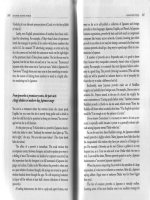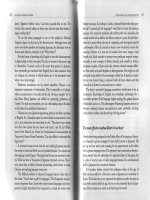Words used to connect clauses
Bạn đang xem bản rút gọn của tài liệu. Xem và tải ngay bản đầy đủ của tài liệu tại đây (13.42 KB, 1 trang )
Words used to connect clauses
In English, we use two types of words to connect clauses. These are conjunctions and relative pronouns.
Conjunctions are of two types:
coordinating conjunctions
and
subordinating conjunctions
.
Subordinate clause
A subordinate clause is a type of clause that cannot stand alone. Subordinate clauses are introduced by
subordinating conjunctions. Examples are: as, because, since, when, while, if, whether, unless, that etc.
I will give you a call
when I am ready.
As she was not ready,
we went without her.
Since they have apologized,
we will not take any further actions against them.
A
subordinate clause
can come either at the beginning or at the end of a sentence. When subordinate clauses
come at the beginning of a sentence, we usually separate them with a
comma.
Main clause
A main clause is a type of clause that can stand alone. Main clauses are also called
coordinate clauses.
Main
clauses are introduced by coordinating conjunctions like
and, but, or, yet, so, for
and
nor.
She is my friend
and I like her.
She was tired
but she was cheerful.
He is one of the best cricketers in the city,
yet his favorite game is soccer.
I like him
so I helped him.
Relative pronouns
Relative pronouns are words like who, whom, whose, that and which. They are used to introduce relative clauses.
Note that relative clauses are also called
adjective clauses.
Relative pronouns
connect two clauses. They also act as the subject or object of the verb in the relative clause.
This is the girl who won the first prize.
This is the problem whose solution has baffled everybody.
Relative adverbs
Relative adverbs are words like
when, where
and
why.
Like relative pronouns,
relative adverbs
are also used to
connect two clauses.
Do you know a place
where
I can buy used cameras?
Do you know the reason
why
she hates me?
I will never remember the day
when
I first met her.
Be first to know when grammar rules change! Sign up to our newsletter here: englishgrammar.org (It's free)
Powered by TCPDF (www.tcpdf.org)









